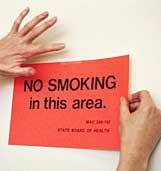|
Module 69-B |
Updated: 07/12/2005 |
|
Careers Part II
Internships Apart from actual paid, on-the-job experience, internship experience ends up being the most important "plus" on your résumé. Among other things an internship suggests that you have been serious about the field and that the school-to-job transition should be easier. Because union rules often discourage or prohibit stations from hiring interns that are not in school, vigorously pursue this option while you are still a student. Even in non-union facilities you will face much more competition to "get in the door" after you graduate. Internships can provide important professional contacts. By keeping in touch with people you meet and work with during an internship, you will often know of job openings far in advance of seeing them posted on the Internet or in professional publications. One of the best ways to keep in touch with these people is by
maintaining a permanent e-mail address. Keep in mind that landing your first job will probably be the hardest because most people hired in TV come from other stations and have that valuable qualification called "experience."
For each job opening there will generally be a number of interested candidates. Only one will get the job. When you first apply for a job you will probably be represented
solely by a cover letter and résumé. Without dwelling on the need for impeccable
writing, organization, etc., let's just say that your résumé and cover letter have
to be strong enough to outshine the competition and get you invited in for an interview.
The computer scanning of résumés is becoming more commonplace.
This can work to your advantage if you understand the process. The
article, Preparation for landing that first job must start long before the interview. You need a head start on such things as internship experience and compiling an impressive résumé. Let's look at some résumé considerations. Since on-the-job training (and mistakes)
are costly to an employer, Unless you can fully "feather out" your résumé with professional experience, don't neglect unrelated employment, especially if you're just graduating. Showing an employer that you can hold down a job-any job-indicates that you've learned to deal with responsibilities and deadlines. Plus, it will provide an employer with some "real-world" references. When listing your experience on a written résumé don't overlook extracurricular activities. Have you produced or directed a TV show or a series at your school? Have you won any awards? Such things may separate you from other applicants.
While in production classes be sure to save good examples of your work for your résumé reel. (Even though we are an in era of DVDs, the term "reel" is still used.) In most areas of TV prospective employers assume you will have a reel of your best work. In assembling your reel, don't save the best to last. Those reviewing a stack of VHS tapes or DVDs often don't take the time to view more than an opening cut. Ideally, you'll want to lead off strong and finish strong and make the whole résumé reel no longer than 5-10 minutes. (After you produce or direct several network productions and a few national commercials you can make it longer-and expect it all to be watched!) Even though the time is short, make sure you clearly get your ideas across. Don't worry about bars and tone at the beginning; this is not intended for broadcast. Employers know that anyone can make exciting segments out of exciting events. The real test is if you can make more mundane subject matter interesting. Use a computer to make a professional tape or DVD label, and be sure you include your name and contact information. You will, of course, include a cover letter with more information. Rather than just stark black lettering on a white label, more creative applicants have been known to capture an impressive frame out of their video to use as a background for the label. Being creative and computer literate (without being ostentatious or pretentious) are important qualifications in this field. It's a good idea to tailor your résumé reel to the job you are applying for. Is the job in sports, weather, field reporting, studio anchoring, or interviewing? Make sure your résumé reel emphasizes what you are interested in while not closing the door to other possibilities. Study the station's programming if at all possible and include only what seems to fit into the job description and their approach to things. In order to do this you will need to have a lot of raw material to choose from. If you are not going to have ready access to video editing equipment, you might consider equipping your computer with an editing program and DVD burner (recorder). Once you do, you should be able to quickly assemble tailor made résumé reels as the need arises. Unlike many fields, which may sift through applicants for weeks or even months, jobs in broadcasting are generally filled rather quickly.
Video Awards Of
course, TV production awards can make a résumé "sparkle."
Consider entering some of your best work in some of the many video contests. A search
of the Internet should net you many possibilities, including As a judge in some of these contests, I can attest to the fact that some contests have few applications in some categories and your chances for netting yourself an award-even a national award-can be very good. Just keep your model releases handy in case they ask for them, and be wary of competition that requires a substantial entry fee.
It may be difficult for today's young TV viewers to imagine a time when every face in TV news (with the possible exception of "the weather girl") was male. For decades it was assumed that women could not impart the same authority to TV news that men could-especially in anchor positions. Thus, ratings conscious program managers kept women out of key on-air news positions. A number of research studies challenged this view, including one co-authored by this writer. After identical newscasts were delivered by professional male and female newscasters, written tests were given to audiences to determine such things as recall and credibility. The results found that there was essentially no difference between the male and female newscasts. Although research dispelling the myths surrounding the credibility of female newscasters may have helped, it was the government mandated equal opportunity laws in the mid-to-late 1900s that were mostly responsible for opening the door to both women and racial minorities in broadcasting. |
|
From the above graph you can see that the percent of women in general TV news positions in 2002 is almost 40%. Today, the percent of women holding administrative positions such as TV News Director and General Manager still hasn't reached anything like 50%, but it's a long way from the "zero percent" of a few decades ago.  Looking
for Work in Looking
for Work in All the Right Places CyberCollege and the InternetCampus
have links to scores of Several broadcast-related trade publications, including Broadcasting and Cable Magazine, regularly carry ads for jobs. When all other leads dry up, you
can use the "shotgun approach" of sending out unsolicited résumés to selected TV
stations and production facilities. By checking TV station web pages on the Internet,
or by looking up stations in the latest edition of The Television & Cable
Factbook, you can find the names of personnel managers and department heads.
If at all possible, direct your letter to a specific person by name and title. This
factbook is now available on-line through Even though you may not hear from many of the people you write to-they are very busy-they may keep your résumé on file and you may get a call when a job opens up. The job-hunting process may take a while, so - Learn to handle rejection without dejection.
If you can stay optimistically persistent and keep pursuing
every possibility, the chances are good that eventually you'll end up being the
right person at the right place at the right time.
If you get called for an interview,
make sure to do your "homework" before you Surveys of employers have turned up some shortcomings of recent U.S. graduates that, if detected during an interview, can knock a candidate out of the running. Although you might consider some of the following a "bad rap," you still need to know that many employers are on the lookout for these weaknesses. Because of the problems inherent in firing employees, when faced with some questions about a prospective hire, many employers and personnel managers simply adhere to the saying, "If in doubt, don't." In a competitive field like television there are just too many qualified applicants to take a chance. Suffice it to say, keep these "big five" knockout factors in
mind and don't give a prospective employer any reason to doubt your suitability.
The Five Knockout Factors 1. Inability to follow instructions - Employers have said that new hires have difficulty following instructions, either preferring (with limited knowledge about why things are done in certain ways) to "do it their way," or simply not being able to carefully listen to and carry out instructions. 2. Promptness and reliability issues - It's alleged that many new hires, especially those who have not successfully held a job before, don't appreciate the need of getting things done right (the first time) and on time. 3. A need for constant supervision - It's alleged that many new hires sit around wait around for someone to tell them what needs to be done, instead of being "self-starters" (being able to figure out what needs to be done and do it). 4. Attitude
5. Slovenly work habits; slovenly personal habits. This relates to everything from being neat, well-groomed, and organized, to following through on important details in work assignments. A factor that was not mentioned,
but one that represents a very decisive knockout factor, is substance abuse
(primarily drugs and alcohol). Both are clearly linked to accidents, absenteeism,
and problems in the work place. No employer wants to risk the problems either represent.
Personnel managers are also aware that smoking has been linked to general health problems, absenteeism, and reduced efficiency. So, when this is an issue, and a personnel manager faces a choice between two equally qualified candidates.....well, you can figure that out. (And, yes, it is lawful in some states to refuse employment on the basis of smoking.) Not surprisingly, promotions and advancement are also related to all of these factors. Unfortunately, some people only find out about these realities after having been repeatedly been fired from jobs or regularly passed over for promotions. Once you have a string of "negatives" of this sort on you record, getting subsequent jobs and promotions becomes increasingly difficult.
Turning from the negative to the positive, when
you are able to get into the field, you'll know that you are in the company of others
like yourself-men and women who have demonstrated that they have what it takes to
make it in a competitive, rewarding, and often very exciting profession.
In the next module we
will conclude this course.
|

 experience is ranked at the top of desirable qualifications. Not everyone
will be fortunate enough to spend their summers working at a TV station. But for
those who have been able to wangle even part-time jobs in the field, employment
prospects will be better.
experience is ranked at the top of desirable qualifications. Not everyone
will be fortunate enough to spend their summers working at a TV station. But for
those who have been able to wangle even part-time jobs in the field, employment
prospects will be better.
 go
in. Know everything possible about the facility. If you can, talk to some
present and maybe even some past employees.
go
in. Know everything possible about the facility. If you can, talk to some
present and maybe even some past employees. problems
- This knockout factor parallels #2 of the 7 criteria for success listed
at the beginning of this module. We're talking about the general positive or negative
demeanor of individuals, whether they are pleasant to work with, how they accept
assignments, and how they take suggestions and criticism.
problems
- This knockout factor parallels #2 of the 7 criteria for success listed
at the beginning of this module. We're talking about the general positive or negative
demeanor of individuals, whether they are pleasant to work with, how they accept
assignments, and how they take suggestions and criticism.